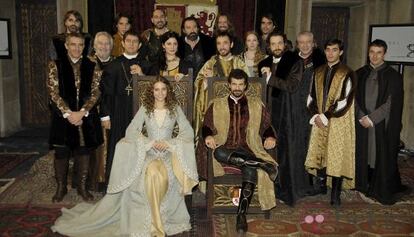Barcelona slams door on Catholic monarchs TV show
Museum sparks row by denying crew of ‘Isabel’ access to film on historic site

Five centuries after she sat on the throne, Queen Isabella I, the Castilian monarch who unified Spain’s kingdoms, has unleashed a new political storm. The Barcelona History Museum has refused to grant the producers of historical drama series Isabel access to film in the historic Saló del Tinell hall, part of the Palau Reial Major complex in the Catalan capital.
The show’s producer, Diagonal TV, says the municipal museum has refused the cameras entry “because of a disagreement with the series’ version of history.”
The museum itself denies that there are any ideological undertones behind its decision, but that hasn’t stopped opposition leaders from classifying the move as censorship and an attack on artistic freedom of expression.
The Socialist Party spokesman in Barcelona City Hall, Jordi Martí, says that the refusal to grant permission to film in Barcelona on the basis of historical stance is “censorship.”
At the other end of the ideological spectrum, the conservative Denaes Foundation for the Defense of the Spanish Nation has filed a complaint with the public prosecutor against Barcelona City Hall’s director of heritage, museums and architecture, Josep Lluís Alay, for “alleged perversion of public authority.”
The museum denies any ideological undertones behind its decision
The producers of Isabel had planned to film in both the Plaça del Rei and the adjacent Saló del Tinell, on the walls of which they wanted to hang flags and standards of the courts of Castile and Aragon. “We had to shoot there because Ferdinand of Aragon was the target of an attack in the Plaça del Rei,” say sources at the production company, who add that they had all the necessary permits from City Hall and the municipal police.
The objection came from Barcelona History Museum director Joan Roca: “I have nothing against scenes being filmed in the square; what I cannot do is cover or redecorate elements of a protected property, as the walls or the balconies could be,” he said.
But Roca’s view conflicts with reality as movies and TV shows are often filmed in heritage buildings in the city.
It also conflicts with the view of the mayor of Barcelona himself, Xavier Trias, who admits to granting permission for Isabel to shoot there. The Socialists wasted no time in reminding Trias that the museum comes under the aegis of his municipal government and that he could easily have lifted the ban. “If Trias thinks Isabel can be shot in Tinell, let him give the order,” Martí said.
The news of Barcelona’s snub led a number of other cities to offer their services to the producers of the hit show, including Soria, Madrid and Salamanca. It was announced on Thursday, however, that the city of Plasencia, in the western province of Cáceres, will be the host city for the scenes.
The announcement was made by Jaume Benacolocha, the producer of Isabel, during an interview on radio station Cadena SER. The area chosen is, he explained, a very well maintained part of the city, featuring palaces, churches and a parador hotel, which is located in a former convent.
According to local newspaper Hoy, the city has already begun to look for extras to appear in the scenes, which will appear in the third series of the show and will be filmed in October.
Isabel is currently one of the biggest hits on Spanish television, and is broadcast on state channel TVE-1. The second episode of the second season was shown last Monday, and attracted a total of 3,632,000 viewers, giving it an 18.9-percent audience share. The number of people who watch Isabel in the Catalonia region, however, is much lower, with just one in every 10 viewers tuning in to catch an episode.
Tu suscripción se está usando en otro dispositivo
¿Quieres añadir otro usuario a tu suscripción?
Si continúas leyendo en este dispositivo, no se podrá leer en el otro.
FlechaTu suscripción se está usando en otro dispositivo y solo puedes acceder a EL PAÍS desde un dispositivo a la vez.
Si quieres compartir tu cuenta, cambia tu suscripción a la modalidad Premium, así podrás añadir otro usuario. Cada uno accederá con su propia cuenta de email, lo que os permitirá personalizar vuestra experiencia en EL PAÍS.
¿Tienes una suscripción de empresa? Accede aquí para contratar más cuentas.
En el caso de no saber quién está usando tu cuenta, te recomendamos cambiar tu contraseña aquí.
Si decides continuar compartiendo tu cuenta, este mensaje se mostrará en tu dispositivo y en el de la otra persona que está usando tu cuenta de forma indefinida, afectando a tu experiencia de lectura. Puedes consultar aquí los términos y condiciones de la suscripción digital.








































